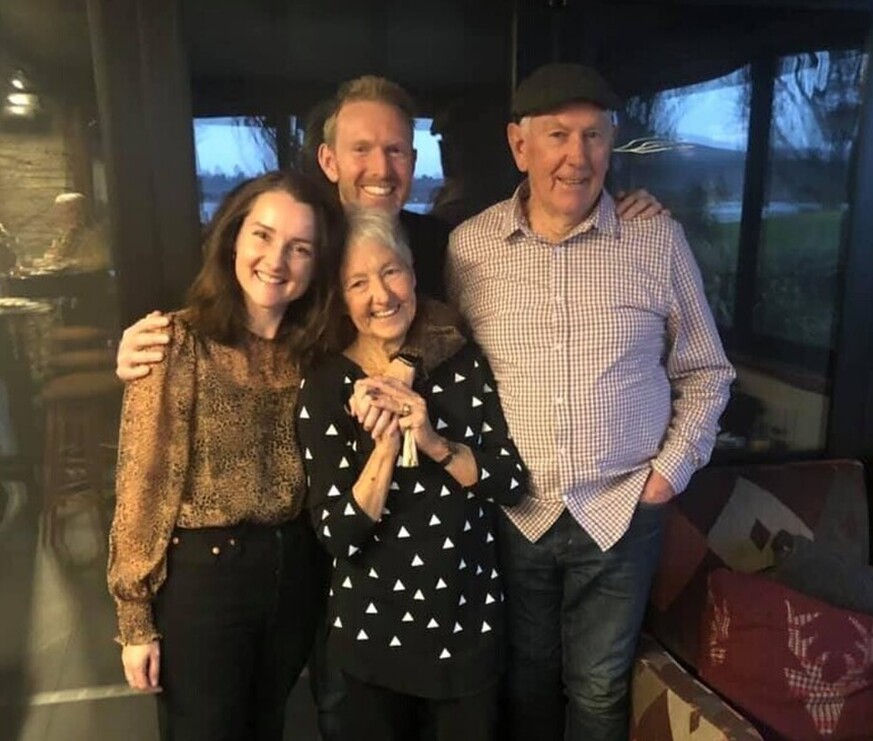Sheryl's Story
In October 2020, Sheryl had a CTscan. Out of the blue, while still in ED waiting for a bed, Sheryl was told she had a mass on my pancreas and a shadow on her liver. A consultant said “it presents as a typical metastasis of pancreatic cancer, in which case there is nothing we can do.”
I had severe concussion at the time, which affected my memory, but certain things had significance and all my senses were heightened. I had no fear or anger. I recognised the need to listen to my instincts. My approach was to remain calm, find humour in frustration, avoid unappealing food and drinks (even coffee!), accept sensible medical procedures, and have assertive conversations with the tumour. I named it Little Critter. I'm not naturally inclined to fight, as it induces stress, which I believe cancer thrives on. Instead, I chose to face Little Critter directly, dance with him closely, and prevent him from getting away on me!
And so it began. I accepted my diagnosis but rejected any interest in a prognosis. My focus was three pronged: cultivating calmness, engaging with Little Critter through dance, and maintaining a constant silent dialogue with him. I became detached, self-centred, and incredibly focused, leaving no energy for anything or anyone else. I will forever be grateful to my husband, son, daughter and daughter-in-law for bolstering and inspiring me.
Throughout this journey, well-meaning individuals, many of whom were strangers, offered unsolicited remedies and advice. They suggested vitamin C infusions, supplements, numerology, herbal remedies, overseas cancer centres, pH level adjustments, urged me to keep fighting and never give up. Some used warfare language like "battle," "victim," "win the war," or "fighter." That made it even more challenging to remain stress-free. My goal is to stay calm and collaborate with, rather than fight against, my illness, without allowing it to be portrayed negatively. The use of "losing the battle" implies either being a quitter or a failure: neither resonate with me.
While seriously unwell, I became hypersensitive and even harmless comments like "You'll be fine" felt like a judgment of me or that I was exaggerating. I chose to not engage in these discussions and I let the words wash over me. This wasn't the best approach because some didn't understand my response which allowed their approach to continue.
After a 2.5-month wait and several CTscans, MRIs, innumerous blood tests, a biopsy and a PET scan, treatment finally began for my adenocarcinoma. Initially, there were nearly five months of two weekly chemotherapy treatments: a cocktail of oxalipatin, irinotecan and leucovorin through a PICC line, followed by fluorouacil for two days by a pump at home. Unfortunately, my body didn’t take to this very well and I was hit with nearly twenty different side effects that progressively worsened with each treatment. My programme had to be cut short by three sessions as a result. Interestingly, I still have peripheral neuropathy two years later. In any case, chemo didn't shrink Little Critter although it did slow his growth. Next came 30 radiotherapy sessions and 28 milder oral chemo (capecitabine) treatments.
During those nine months, I couldn't drive or bike because of my shakiness and fatigue. I had to avoid crowded places due to being severely immunocompromised during a global pandemic. Consequently, my world became smaller, and I relied on others to bring the outside world to me.
On the upside, this period gave me a chance to reflect on my life, leading me to start writing my memoir. Perhaps due to my concussion or cancer treatment, I faced difficulties with syntax and dredging up the right words. Nevertheless, the project continued and served as a therapeutic outlet for my language challenges.
I had hoped to take part in a clinical trial on pancreatic cancer at Waikato hospital but missed my only chance when it was postponed due to a cyber-attack on their DHB. This was the only other form of treatment available to me, however, the criteria for participation included not having received radiation and we could not afford the delay in treatment. The outcome of my chemo radiation programme was not overly positive. Although my light-footed dancing companion hasn’t spread any further, the Oncology team says my cancer status remains unchanged. Little Critter is still there and remains inoperable, having entwined himself around my aortic artery and my superior mesenteric vein. I think he’s sitting there sulking, and that’s fine by me. It seems the treatment has stabilized the situation, and as my daughter said, someone must be part of the low percentage of survivors, so why not me?
I have prepared for my departure, whenever it may come. My will is up to date, I have assigned a power of attorney, and my financial and security information is stored in the cloud. My Advanced Care Plan (Living Will) provides medical directives and my wishes for the end of my life and after death. It serves as a guide for my family during emotionally challenging moments when big decisions need to be made.
And, to the surprise of everyone, including my oncology team, I continue to defy expectations and live a normal, healthy life, outliving my prognosis.
My husband Ralph and I have just completed 120kms of the Alps to Ocean bike trail. Having not been on a bicycle in more than half a century, getting e-bikes opened a whole new world where we experience different scenery, smells, fresh air, sunshine, wind, rain, and an occasional snow blizzard. All punctuated by cafes of course. At the end of each day we arrived at an AirBnb exhausted but exhilarated. It’s such a healthy hobby, apart from being swooped by magpies!
And so I believe, listening to my gut and acting intuitively has served me well.
